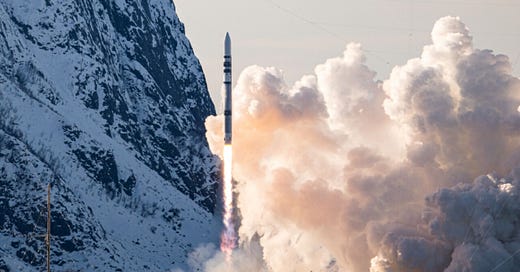Isar Aerospace Secures €150M in Funding
On June 25th, German launch vehicle startup, Isar Aerospace, announced it has secured 150 million euros ($174 million) in funding through a convertible bond from American investor, Eldridge Industries, a Miami-based firm.
Isar stated that the funds would be utilized to enhance launch capabilities and expand series production facilities at its headquarters near Munich.
“We are addressing the growing global demand for satellite launch services by providing independent and flexible access to space to global markets and governments,” said Daniel Metzler, chief executive of Isar. “This investment signifies robust confidence from international markets in our mission to establish a new space leader.”
Isar is developing Spectrum, a small launch vehicle designed to place payloads of up to 1,000 kilograms into low Earth orbit. The company conducted Spectrum's inaugural launch on March 30 from Andøya Spaceport in northern Norway. However, the vehicle lost attitude control less than 30 seconds after liftoff and subsequently crashed into the adjacent waters.
Despite not reaching orbit, Isar executives deemed the launch a success due to the valuable flight data gathered. “Although we didn’t reach orbit, we gained significant insights from the flight, positioning us well for the forthcoming second launch,” Metzler remarked during a post-launch briefing.
“We accomplished our objectives for a test flight,” Stella Guillen, chief commercial officer of Isar Aerospace, commented during a panel at the SmallSat Europe conference in Amsterdam on May 27. “We experienced a successful liftoff followed by 30 seconds of flight, sufficient to collect substantial data, and we are very satisfied with the outcome.” While Guillen did not elaborate on the specific cause of the control loss, she indicated that Isar aims to conduct a second Spectrum flight before the year's end.
“We are currently witnessing substantial demand, particularly in Europe,” she noted, highlighting that Isar has signed several contracts for multiple launches extending until 2032. “We are pleased with our current position.”
Founded in 2018 as a spin-off from the Technical University of Munich, Isar aims to lower the cost and complexity of launching small to medium-sized satellites by offering launch services directly from Europe. Europe’s main rockets, Ariane 6 and Vega C, currently take off from Europe’s primary spaceport in French Guiana, South America. The continent’s companies also heavily rely on SpaceX for access to orbit.
Isar is anticipated to be a leading competitor for the European Launcher Challenge, an initiative by the European Space Agency (ESA) offering up to 169 million euros per company for launching European institutional payloads as well as a “launch service capacity upgrade demonstration.”
During the Paris Air Show last week, ESA officials revealed they had received 12 proposals from companies for the challenge and are now conducting technical evaluations of these submissions. ESA intends to announce in July which proposals have passed the review and will be eligible for funding from the agency’s member states at the ESA ministerial conference in late November.




